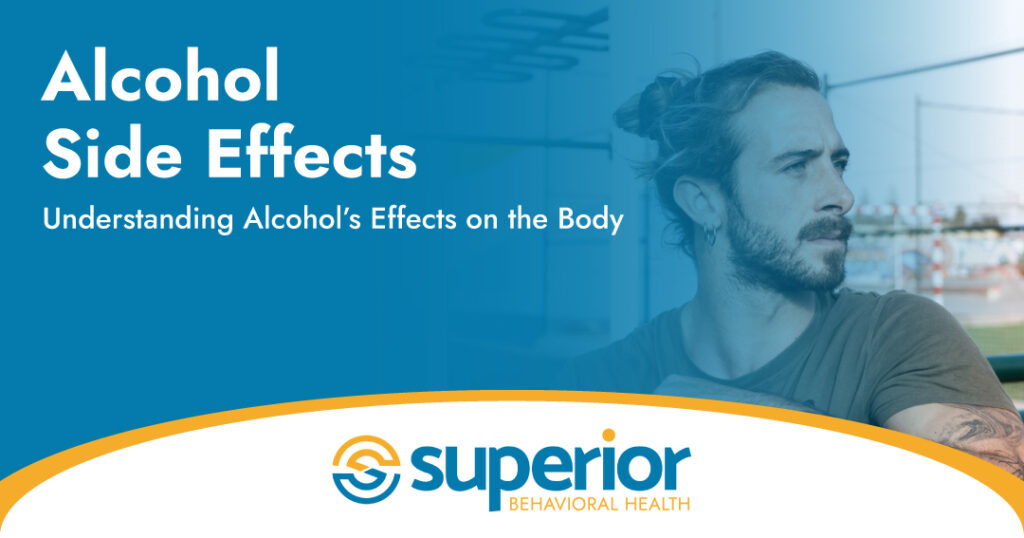A young man spent all Friday night bar hopping at several bars in town. He would drink until the bartender cut him off and then start the process again at another bar down the street. The euphoria he felt was like none other, and he told himself he deserved this feeling of being with friends and drowning himself in alcohol. By morning, that feeling had changed. His head was splitting, he felt crippled with anxiety, and he barely recognized his reflection in the mirror.
Unfortunately, this is a tale as old as time. In 2021, 18.5% of people in Ohio participated in binge drinking. Heavy alcohol use can cause side effects that have the power to change someone from the inside out. This is why we work tirelessly at Superior Behavioral Health to provide individualized, high-quality care for all substance use and mental health disorders. We know you’re tired of waking up to the worst version of yourself, and we want to help you eliminate alcohol’s side effects.
Did that story remind you of yourself or your loved one? Today, we’re talking about how alcohol changes the body and mind, and what you can do to prevent it from happening.
Alcohol’s Effects on the Body
Alcohol has several effects on your body, and drinking excessively can harm your health. These factors can include physical and mental ailments. Excessive drinking is defined as drinking more drinks than how much your body can handle at one time. For women, it is at least 4 drinks in 2 hours. For men, this number is at least 5 drinks in 2 hours. One drink is 8 oz for malt liquor, 12 oz for beer, 5 oz for wine, and 1.5 oz for distilled spirits such as whiskey, rum, and gin.
Alcohol and the Liver
The liver can generally break down 1 drink or less hourly in women and 2 drinks or less in men. However, if more alcohol is consumed in an hour, the liver becomes overwhelmed. This can lead to liver disease over time.
There are three stages of liver disease. The first stage is steatosis, where fat accumulates in the liver. This stage is reversible with recovery from alcoholism addiction. The second stage is known as hepatitis and is when inflammation takes place. This stage usually is still reversible with treatment. The final stage of liver disease is cirrhosis, and the damage is irreversible, leading to liver failure.
Alcohol and the Central Nervous System
Long-term alcohol use can alter normal brain function. It has been known to cause dementia. It can also lead to epileptic episodes, adjusted neurotransmitter systemic balance, and cerebral infections.

Short-Term Side Effects of Alcohol Use
There are several short-term side effects that someone can experience when it comes to alcohol use. These typically only need one episode of binge drinking. These include:
- Lowered inhibitions
- Slurred speech
- Vomiting
- Loss of coordination
- Impulsive behavior
Long-Term Side Effects of Alcohol Use
Over time, with repeated excessive alcohol use, long-term side effects can occur. These are often serious and require medical attention. These can include:
- Cancer
- Memory problems such as dementia
- Depression and anxiety
- High blood pressure
- Stroke
- Liver disease
- Weak immune system
Alcohol Withdrawal
Alcohol withdrawal typically occurs when people have consistently consumed alcohol over time and then suddenly decide to stop. If this is your experience, it is recommended that you control your use of alcohol under a doctor’s supervision. Symptoms of withdrawal can start within hours after your last drink. These symptoms are typically mild but can peak in intensity within 24-48 hours. Afterward, they will decrease in power for several weeks. Symptoms can include agitation, nausea, anxiety, and tremors.
Alcohol Poisoning
Alcohol poisoning is a medical emergency, and if you notice someone is experiencing symptoms of alcohol poisoning, you should call 911 immediately. It typically occurs when you drink more than what your body can handle at one time. It doesn’t matter what type of alcohol you consume – it matters more about how much alcohol you drink. Those who participate in binge drinking are more likely to experience alcohol poisoning. Some common symptoms of alcohol poisoning include slow breathing, blue skin, and unconsciousness.

Get Help for Alcohol Use Disorder Today!
If you’re ready to change your life and free yourself from alcohol’s side effects, Superior Behavioral Health provides compassionate support to the people in Garfield Heights, OH. We are a small, family company with a limited patient load. This allows us to focus on you and your recovery. For more information, call us today at 216-435-1110.
FAQs About Alcohol Side Effects
What is alcoholism?
An alcohol use disorder is typically defined as excessive use of alcohol over some time, followed by cravings and other withdrawal symptoms such as headaches, nausea, and tremors.
Can the side effects of alcoholism be deadly?
Side effects of an alcohol use disorder can be deadly if not treated. But recovery from alcohol use is possible.
What is alcohol poisoning?
Alcohol poisoning is a medical emergency. If someone is experiencing symptoms of alcohol poisoning, 911 should be called. Some symptoms to be aware of include blue skin, unconsciousness, and slow breathing.


